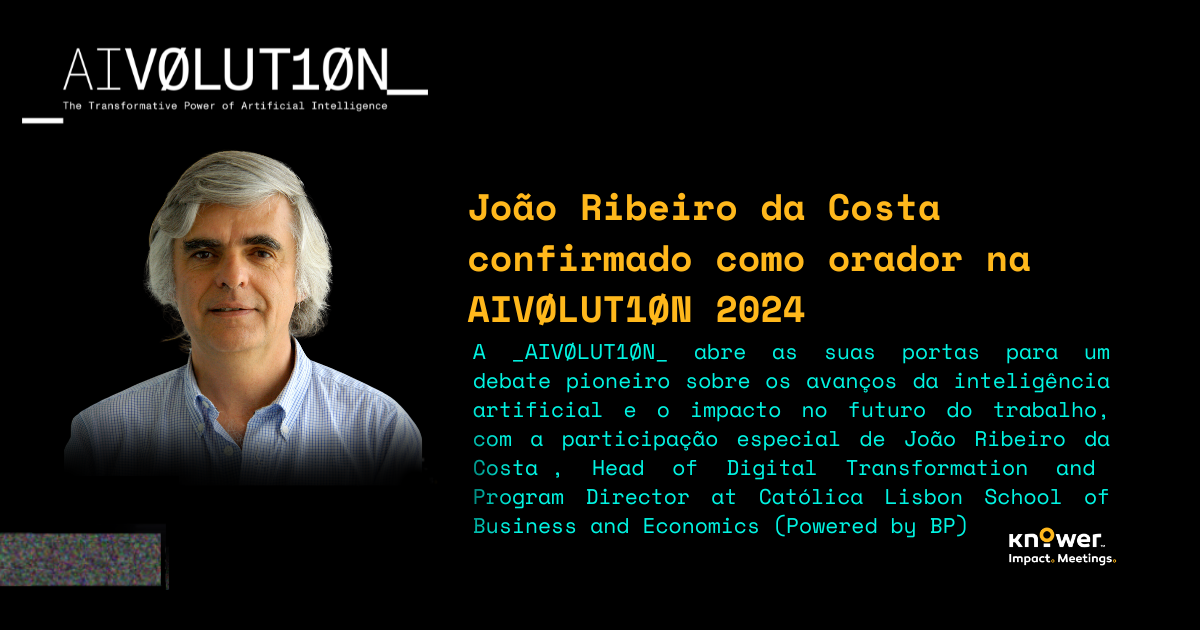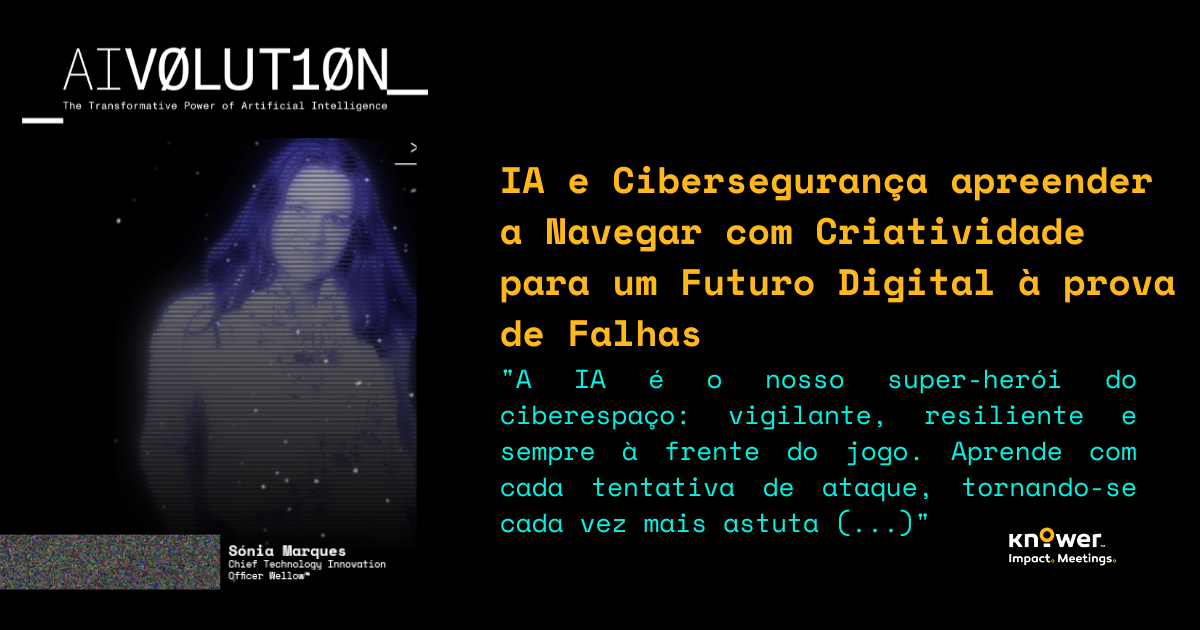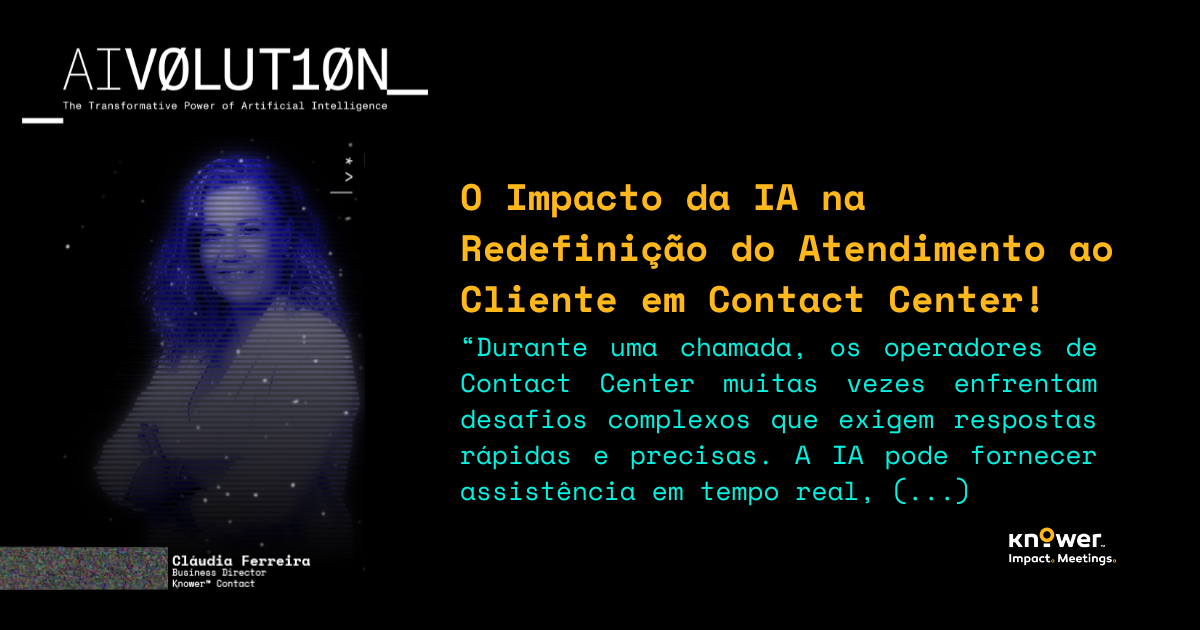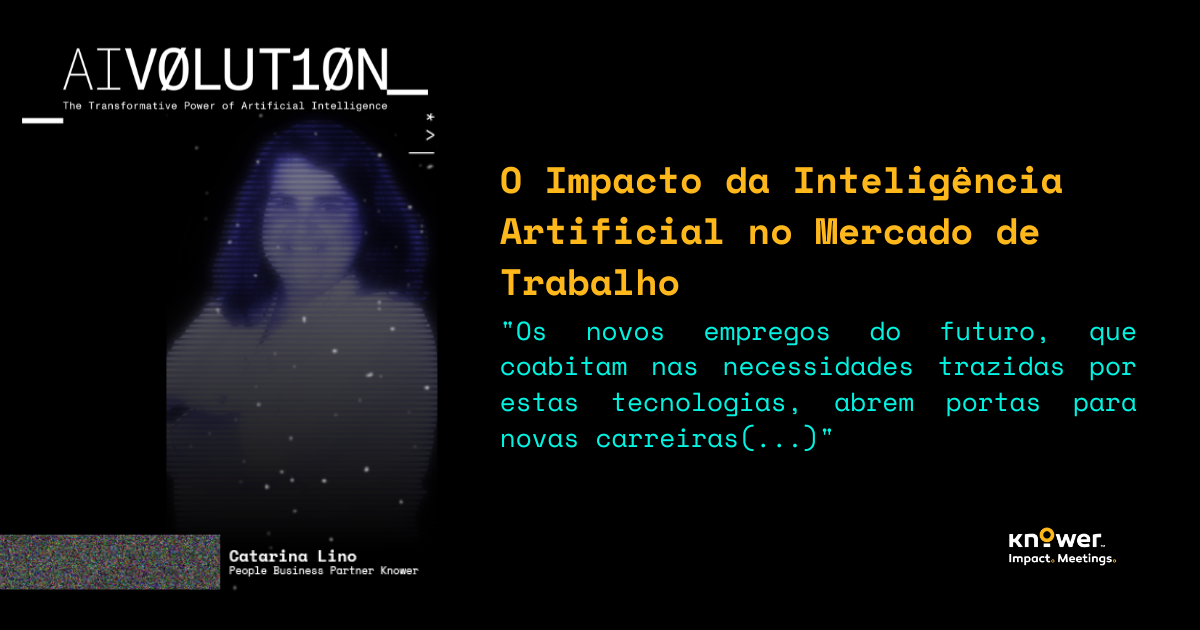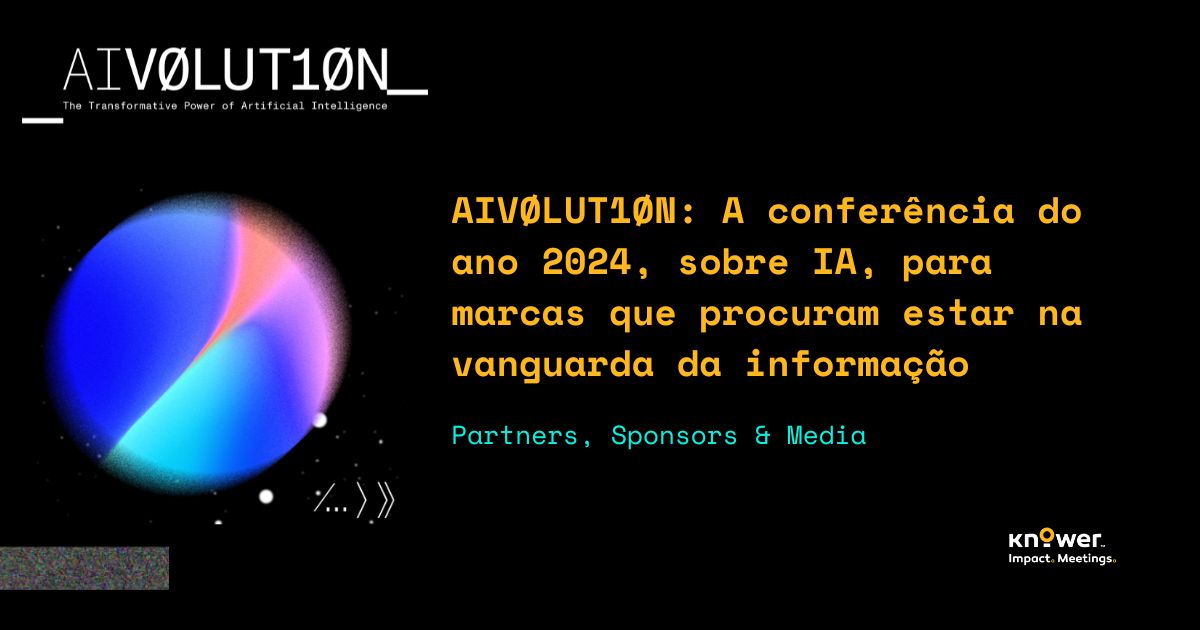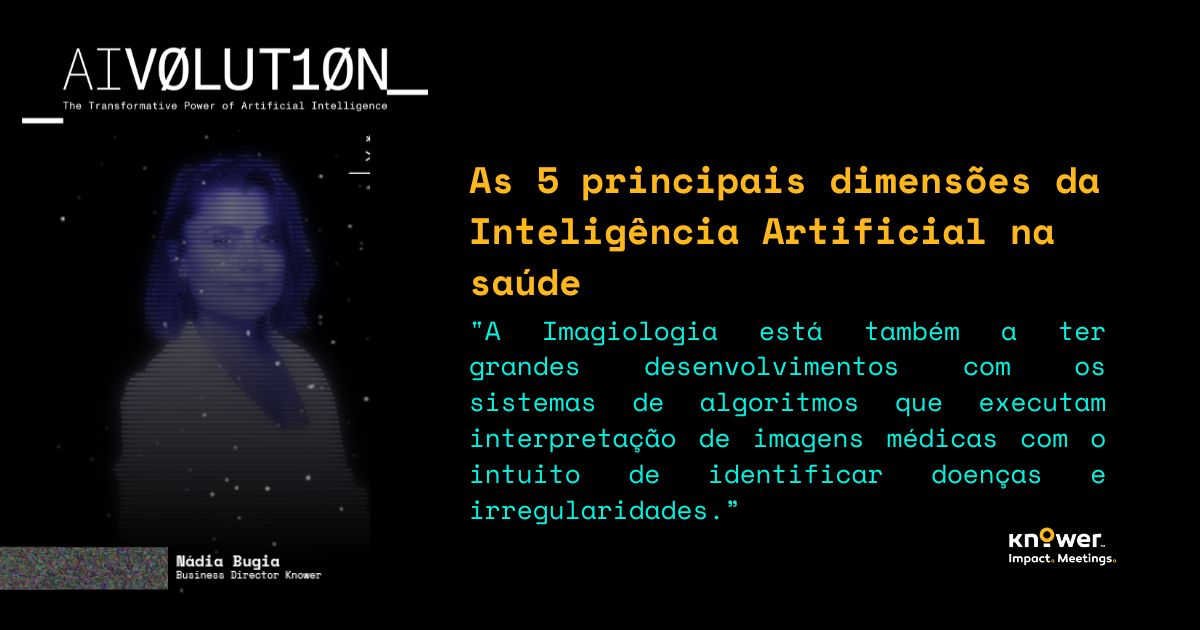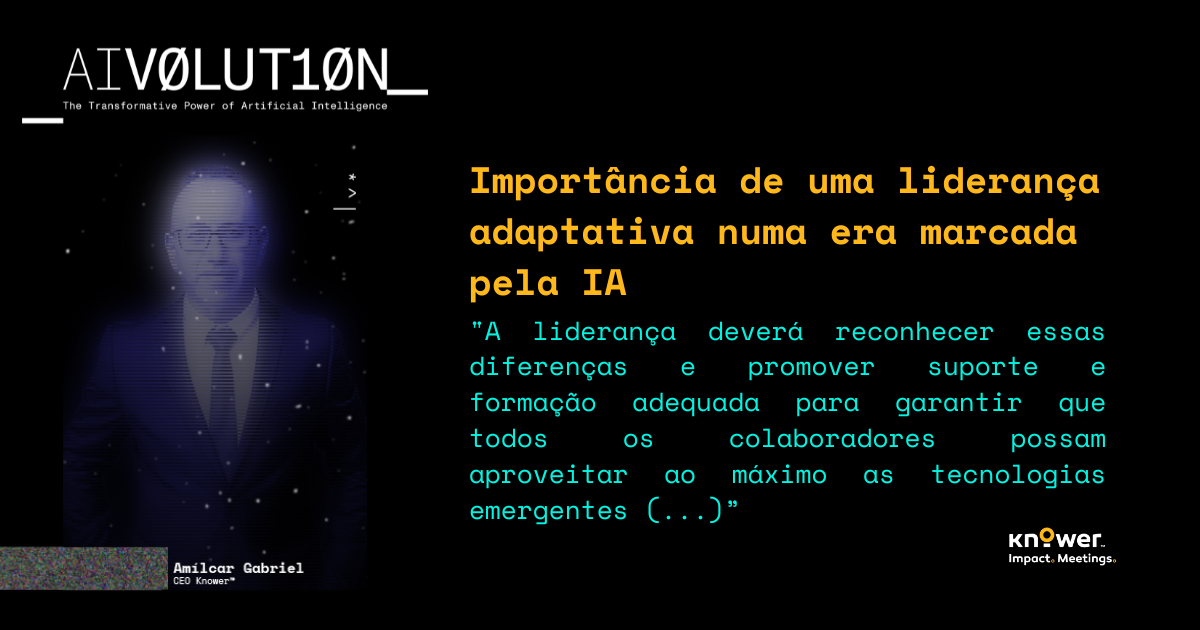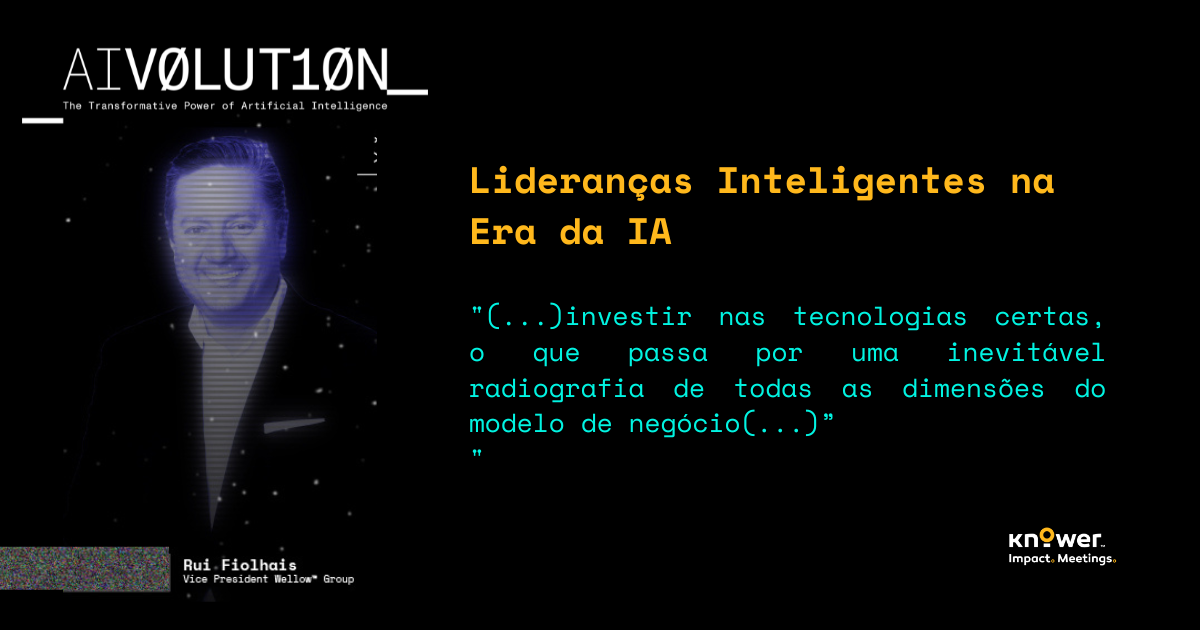_AIVØLUT1ØN_
- by Jessica Simoes
- (0) Comments
João Ribeiro da Costa confirmado como orador na AIVØLUT1ØN 2024
A _AIVØLUT1ØN_ abre as suas portas para um debate pioneiro sobre os avanços da inteligência artificial e o impacto no futuro do trabalho, com a participação especial de João Ribeiro da Costa , Head of Digital Transformation and Program Director at Católica Lisbon School of Business and Economics (Powered by BP) AIVØLUT1ØN, evento líder em transformação digital e inteligência artificial para empresas, tem o prazer de anunciar João Ribeiro da Costa, Senior Affiliated Professor e Head of Digital Transformation na Católica-Lisbon (Powered by BP), como um dos oradores na primeira mesa-redonda intitulada “Talento, Desenvolvimento da Força de Trabalho e IA Responsável”. Com uma carreira distinta de três décadas nas tecnologias de informação e duas décadas de empreendedorismo, João foca atualmente a sua atenção e expertise no domínio da transformação digital. Ele é um acadêmico renomado, contribuindo para a educação e formação de futuros líderes através de programas de licenciatura, masters internacionais e executivos, bem como MBAs. A mesa-redonda explorará o enorme potencial da IA para remodelar a economia global, com um foco especial nas economias mais avançadas, bem como os early adopters, que estão a experimentar tanto os benefícios quanto os desafios desta tecnologia disruptiva. Os bilhetes para a AIVØLUT1ØN já estão disponíveis através do site do evento – <a href="https://aivolution.knower.pt/" target="_blank"https://blueticket.meo.pt/Event/10571// – ou em Meo BlueTicket.
- by Jessica Simoes
- (0) Comments
A Inteligência Artificial e a Cibersegurança
No turbilhão digital em que nos encontramos, a Inteligência Artificial (IA) surge não só como uma inovação, mas como um motor de transformação abrangente. Contudo, à medida que a nossa dependência da IA aumenta, também aumenta a nossa exposição a riscos cibernéticos. Aqui, entre ideias inovadoras e soluções criativas, exploramos como manter a segurança da nossa inovação. Vamos abordar, com um olhar dinâmico e divertido, os desafios e oportunidades que a IA apresenta ao mundo da cibersegurança, com o objectivo de assegurar um futuro digital tanto brilhante quanto seguro. Sónia Marques O Impacto Transformador da IA na Defesa Cibernética: A IA é o nosso super-herói do ciberespaço: vigilante, resiliente e sempre à frente do jogo. Aprende com cada tentativa de ataque, tornando-se cada vez mais astuta. Imagine-a como um detective cibernético, excepcionalmente hábil a identificar padrões suspeitos e comportamentos anómalos, sempre pronta a desvendar e neutralizar ameaças com um toque de magia digital. Desafios Criativos na Integração da IA: No entanto, a IA não é uma solução milagrosa. A sua eficácia depende da qualidade dos dados que consome. Dados imprecisos resultam numa IA confusa. Além disso, enfrenta o desafio constante de se adaptar a novas ameaças, uma verdadeira corrida contra o tempo e o inesperado no mundo cibernético. A Batalha de Inteligências: Os adversários estão a levar a sério, utilizando a IA para desenvolver estratégias cada vez mais sofisticadas. É uma guerra de engenhos onde a linha entre defensor e atacante é ténue, um verdadeiro jogo de xadrez cibernético onde cada movimento é crucial. A Batalha de Inteligências: Os adversários estão a levar a sério, utilizando a IA para desenvolver estratégias cada vez mais sofisticadas. É uma guerra de engenhos onde a linha entre defensor e atacante é ténue, um verdadeiro jogo de xadrez cibernético onde cada movimento é crucial. Aprendizagem e Resiliência, Crescer com Cada Desafio: Cada contratempo é uma oportunidade disfarçada. No universo da IA e cibersegurança, os erros são preciosos, revelando onde precisamos reforçar as nossas defesas, sempre com um olhar criativo para transformar falhas em fortalezas. Ética e Privacidade no Coração da Questão: A ética é inegociável. Ao utilizar a IA em cibersegurança, os dilemas éticos são fundamentais. É imperativo navegar com cautela, garantindo que a privacidade e os direitos individuais sejam respeitados, equilibrando segurança com liberdade, num delicado equilíbrio entre protecção e direitos pessoais. Olhar para o Horizonte:As tendências emergentes na intersecção da IA e cibersegurança prometem revolucionar a nossa abordagem à defesa digital. Da IA autónoma à maximização da sua aprendizagem, estamos à beira de uma nova fronteira, prontos a explorar com curiosidade e entusiasmo, sempre em sintonia com a inovação e a segurança. Construir juntos: A união faz a força. A colaboração internacional e a educação em cibersegurança são essenciais. Cada um de nós tem um papel a desempenhar nesta jornada, capacitando-nos a reforçar a nossa cadeia de segurança com conhecimento, criatividade e um espírito colaborativo. Concluindo, dançar com o futuro da integração da IA na cibersegurança é mais do que uma mera adaptação às mudanças tecnológicas; é um compromisso com a evolução responsável e a segurança contínua das nossas inovações digitais. Ao abraçarmos a colaboração, nutrirmos a criatividade e nos comprometermos com os mais altos padrões éticos, estamos a pavimentar o caminho para um amanhã digital mais seguro e vibrante. Vamos continuar a avançar, com confiança e vigilância, para moldar um futuro onde a tecnologia e a segurança andem de mãos dadas.
- by Jessica Simoes
- (0) Comments
Politics made by Artificial Intelligence?
Este título, provocatório, expõe um dos múltiplos desafios que enfrentamos com o implementação e expansão de várias tecnologias em torno da Inteligência Artificial (IA). Qualquer tecnologia actualmente, visto que ainda não cruzámos a singularidade, ou seja, o ponto em que a tecnologia será capaz de auto percepção, consciência autónoma e intrínseca determinação em seguir os seus desejos mais lineares, como a auto preservação, ainda é neutra. Francisco Guerreiro Ou seja, o seu uso pela espécie humana ainda determina a sua objectividade, utilidade e impacto (social, económico e culturalmente positiva ou negativa). Por enquanto estes avanços tecnológicos estarão, também devido aos seus graus de riscos, alicerçados a regras e controlos. Actualmente, e bem, a União Europeia é o primeiro bloco transnacional a legislar sobre a IA, tendo um acordo entre a Comissão Europeia, o Parlamento Europeu (PE) e o Conselho da União Europeia (UE) sido alcançado em dezembro de 2023, sobre o pacote legislativo de nome “EU AI ACT”. Esta legislação, que recentemente foi aprovada numa votação conjunta da comissão do Mercado Interno e da Protecção dos Consumidores (IMCO), e da comissão das Liberdades Cívicas, da Justiça e dos Assuntos Internos (LIBE), aguarda agora a votação final no plenário de abril. E, ao contrário das visões nacionalistas bacocas, a UE foi pioneira, aplauda-se, na legislação coordenada e estratégica da IA nesta transição faseada e calculada, dentro do possível, para um sistema económico e social mais digital. Tal como hoje vivemos conectados à Internet, no futuro, talvez não vivamos sem IA. E por tal, como eurodeputado fiz parte da maioria que decidiu legislar sobre o futuro da IA de modo a garantir que a mesma fosse centrada no Humano (Human centered) e tivesse diferentes graus de risco. Com risco inaceitável, logo banido, temos a criação de deep fakes, tal como o uso indiscriminado no reconhecimento facial e análise biométrica em bases de dados e em tempo real, mas também a eliminação do seu uso em pontuações sociais (social credit system /social scores). Resumidamente, consoante o grau de risco a legislação bane, restringe ou regula o produto, a actividade, o sector. Este caminho determina que sejamos nós, inclusive no seio de instituições internacionais, que comandemos o futuro desta tecnologia que, se bem usada, terá efeitos positivos no tecido socioeconómico, nas empresas e no dia-a-dia dos cidadãos, mas que se utilizada para fins hegemónicos ditará o fim das sociedades livres e democráticas. Mas mais do que o debatido, e votado no seio da UE, falta conversarmos, projectarmos e sabermos para onde caminhamos como sociedade. Sobretudo abrindo essa conversa às pessoas que estão menos instruídas no tema. A questão ética em torno do uso da IA tem uma importância fundamental nomeadamente quando os destinos da Humanidade parecem ser dirigidos por pequenos grupos e gurus tecnológicos em vez das instituições políticas nacionais e supranacionais. Isto porque, se considerarmos que a existência humana se baseia no comunitarismo (calma, não é o mesmo que comunismo), na cooperação, na interdependência e na exponenciação das experiências e relações humanas, coloca-se a questão existencial de: “Para onde é que caminhamos como um todo?” Ao contrário das teorias e práticas capitalistas e neoliberais, que nos sugerem e impingem que a soma das individualidades criará uma massa colectiva próspera, e que maioritariamente pelo consumo alcançaremos a plenitude existencial, a evolução Humana demonstra-nos o inverso. Estamos socioeconomicamente interligados e necessitamos, num contrato social justo, que se garantam as liberdades individuais e se reforce a nossa independência existencial, sempre com um profundo debate cívico e político que integre o máximo de participantes. Nunca deverá ser uma elite, muito menos tecnológica, a gerir e a decidir o nosso futuro. Senão seremos sempre tratados como essas individualidades, meros produtos a serem transacionados. Relacionado, somos diariamente bombardeados com notícias circunstanciais e horas infinitas de comentadores especialistas em tudo e em nada, acicatados com desinformação generalizada nas redes sociais, sem centralizarmos o debate sobre os impactos existenciais destas tecnologias disruptivas. Ou seja, para que servirá em última instância o crescimento da IA? Para diminuir a carga laboral? Aumentar a produtividade empresarial e industrial? Dividir a riqueza gerada? Garantir mais acesso a bens e serviços com menores custos ambientais e económicos? Proteger a nossa liberdade de um totalitarismo securitário? Encaminhar-nos para uma tirania tecnocrata? Facilitar a automatização e robotização de conflitos? Integrar-se fisicamente com a biologia Humana? Lembro-me desta ausência de caminho e de limite, mesmo que conceptual e tendo a UE legislado sobre o assunto, quando no Japão, enquanto membro da comissão IMCO e em visita oficial do PE, questionei um quadro executivo de uma multinacional tecnológica onde estaria a linha vermelha da empresa em termos de desenvolvimento da IA, tal como qual era a sua posição relativamente ao Transumanismo (que pode mesmo gerar a corrida à implantação de chips cerebrais que utilizam IA de modo a transformar o processo cognitivo humano dando-lhe aptidões tecnológicas inimagináveis). A resposta deste, tal como de toda a sala, foi um redondo não sabemos. Creio assim que o objectivo último da IA, e da tecnologia em geral, está ainda por debater. Isto porque, pese embora já haja alguns núcleos de debate sobre que caminho devemos tomar como sociedade, a voracidade deste modelo social, económico e cultural, afecto ao individualismo, ao consumismo e ao crescimento infinito (impossibilidade física em qualquer ecossistema saudável e equilibrado) ditará que continuaremos a cavar o fosso entre quem tem mais recursos, poder, acesso e garantias, e os restantes. Porque assim é o debate político e existencial profundo actualmente. Praticamente inexistente. É assim urgente centrarmos a conversa, em torno desta e qualquer tecnologia, sob o prisma de que sociedade desejamos construir e qual o papel do ser humano na mesma. Concluo com a provocação com que iniciei este artigo. Será a IA, num futuro breve, a decidir politicamente os nossos destinos? Talvez se mantivermos este paradigma social, económico e cultural, disfuncional. Porém uma certeza teremos. Se assim for a existência humana será distópica e tirânica.
- by Jessica Simoes
- (0) Comments
The Impact of AI on Redefining Contact Centre Customer Service!
Mudam-se os tempos, mudam-se as Vontades! É isto que se tem vindo a sentir nos Contact Center ao longo dos tempos… A exigência dos clientes tem vindo a aumentar e com isso tem vindo a existir uma mudança e constante adaptação do setor! Desta forma, desde o sistema de contacto telefónico apenas, mais tradicional, tem-se vindo a evoluir para um atendimento através de telefone, email, chat, chatbots, etc. (serviço multicanal). Este passou a ter que ser personalizado, rápido e em linha com as necessidades do cliente, que pretende, cada vez mais uma experiência e atendimento único e exclusivo. O mais recente salto nesta evolução contínua é o da utilização da Inteligência Artificial! Nos últimos anos, a Inteligência Artificial (IA) tem vindo a desempenhar um papel cada vez mais importante numa variedade de setores, e os Contact Center não são exceção! Cláudia Ferreira A combinação da capacidade de processamento de dados da IA com a empatia e compreensão do ser humano que está no atendimento pode resultar numa maior eficiência e maior satisfação do cliente. Em Contact Center lidam-se com uma variedade de tarefas repetitivas, como por exemplo, a de responder a perguntas standard, fornecer informações simples e encaminhar chamadas para os departamentos apropriados. Neste caso, a IA pode ser utilizada para automatizar essas tarefas, libertando os colaboradores para lidarem, estes sim, com questões mais complexas e eventualmente de maior importância. Isto faz com que haja uma melhoria na eficiência operacional, mas também reduz a carga de trabalho dos colaboradores, permitindo que se concentrem em interações mais significativas. Outra das formas em que a IA pode complementar o trabalho humano, neste contexto, é ao ajudar a personalizar o atendimento ao cliente. Com algoritmos de IA é possível de se analisar um grande volume de dados, de modo a entender as preferências individuais dos clientes, histórico de interações e até mesmo, indo um pouco mais além, ao tom emocional de uma conversa. Estas informações podem depois ser utilizadas para personalizar as interações, permitindo oferecer soluções mais relevantes e satisfatórias. Durante uma chamada, os operadores de Contact Center muitas vezes enfrentam desafios complexos que exigem respostas rápidas e precisas. A IA pode fornecer assistência em tempo real, sugerindo respostas com base em informações contextuais bem como no histórico do cliente. Isto permite que os operadores resolvam problemas de forma mais eficiente, mas também aumenta confiança e até a capacidade de resposta dos mesmos, especialmente quando ainda têm pouca formação e/ou experiência. Por fim, a IA pode ser usada para analisar dados de interações passadas e feedback do cliente para identificar áreas de melhoria no serviço. Ao analisar padrões e tendências, os Contact Center podem fazer ajustes proativos aos seus processos e políticas para melhor responder às necessidades e expectativas dos clientes. Assim sendo, a IA tem o potencial de revolucionar a forma como os Contact Center operam, complementando o trabalho humano e melhorando a experiência do cliente. Ao aproveitar o poder da IA para personalização, automatização, análise de emoções e assistência “on time”, os Contact Center podem oferecer um serviço mais eficiente, eficaz e com maior taxa de satisfação. No entanto, é importante lembrar que a IA deve ser vista como uma ferramenta para complementar o trabalho dos agentes humanos, mas não substituí-los completamente, de forma a garantir assim um equilíbrio ideal entre tecnologia e empatia. Por outro lado, é importante que as empresas utilizem esta tecnologia com responsabilidade e que reflitam sobre os desafios éticos associados à sua utilização. Se assim o fizerem, podem aproveitar ao máximo o potencial transformador da IA no atendimento ao cliente e permanecer competitivas num mercado em constante mudança.
- by Jessica Simoes
- (0) Comments
The Impact of Artificial Intelligence on the Labour Market
A rápida evolução da Inteligência Artificial (IA) está a redefinir o cenário do mercado de trabalho, trazendo consigo desafios e oportunidades. A automação de tarefas, a necessária requalificação de trabalhadores e as mudanças na natureza das tarefas a realizar estão entre os aspetos mais significativos dessa transformação. À medida que algoritmos avançados e sistemas automatizados ganham terreno, é certo que tarefas repetitivas e rotineiras serão cada vez mais delegadas à inteligência artificial. Catarina Lino Por outro lado, a crescente utilização de GenAI em funções como marketing, customer service ou até desenvolvimento de produto/serviços leva o debate sobre o papel da AI em funções mais qualificadas. Independentemente do grau de qualificação da função, a oportunidade deste uso é a da eficiência. Se assente em competências e habilidades que maximizem a utilização regular de AI, teremos profissionais e empresas aptas a navegar por entre os condicionalismos tecnológicos e éticos desta poderosa ferramenta. Assim, é óbvio que apenas poderemos enfrentar a automatização através da requalificação contínua de trabalhadores. Programas de formação e desenvolvimento de competências são vitais para equipar os profissionais com o conhecimento técnico e habilidades necessárias para se adaptarem às novas exigências do mercado. As empresas têm um papel crucial em apoiar e investir no desenvolvimento de suas equipas, a par do investimento na tecnologia, pois só assim conseguirão uma transição mais suave para novas funções e responsabilidades sem perder produtividade / eficiência nas entregas do dia-a-dia. A utilização de GenAI para otimização de processos de recrutamento e seleção, gestão de carreiras e fidelização de talento é feita pelos dois lados da equação: não são só as empresas que se apoiam nestas ferramentas mas também os profissionais que valorizam o aporte de valor no seu quotidiano. Este uso “democrático” do poder de análise de dados, de geração de texto, imagem e até da criação de planos de negócio ou mesmo de novas estratégias de desenvolvimento tem inerente um sentido de oportunidade tão impactante como o que veio com o uso generalizado de eletricidade ou da world wide web. Está na ponta dos nossos dedos a hipótese de aceder a um potencial em espera de se cumprir – posso incluir uma fotografia de qualidade profissional no meu CV sem o custo inerente a uma sessão fotográfica, posso melhorar a minha sinopse do LinkedIN com uma versão robusta de um copy que me valorize, posso rever o meu CV para que seja melhor cotado pelo software de triagem utilizado por recrutadores e até consigo criar uma estratégia de networking que me posicione para “aquela” promoção. Comentários quanto à qualidade destes resultados comparados com os advindos de serviços profissionais serão confirmados ou vetados com a passagem do tempo e a sua utilização, mas o acesso imediato a soluções que permitem começar melhor posicionado já estão aqui, a uso e a impactar carreiras. Assim, a reflexão sobre AI no mercado de trabalho leva-nos a uma conclusão de natureza “lapalissada”: este é um momento decisivo, em que as decisões de todos os utilizadores (existentes e potenciais), serão o fator que permitirá não apenas sobreviver, mas prosperar num ambiente de trabalho impulsionado pela inteligência artificial.
- by Jessica Simoes
- (0) Comments
AIVØLUT1ØN: The AI conference of the year 2024 for brands looking to be at the forefront of information
AIVØLUT1ØN_ -The Transformative Power of Artificial Intelligence, marcado para o dia 29 de Maio de 2024 em Lisboa, promete ser o evento mais revolucionário do ano em Lisboa sobre Inteligência Artificial. Organizado pela Knower™ Impact Meetings, este encontro é mais do que uma conferência: é um marco na história da IA, onde as ideias mais inovadoras e as mentes mais brilhantes se encontram. E juntam-se… Ser patrocinador da AIVØLUT1ØN é estar no centro deste movimento revolucionário. É com enorme satisfação que anunciamos os mais recentes parceiros nesta jornada transformadora: A presença destes patrocinadores na _AIVØLUT1ØN_ -The Transformative Power of Artificial Intelligence simboliza a união da inovação e da visão futurista. Não perca a oportunidade de explorar o futuro da IA com os principais especialistas do setor. Reserve já o seu bilhete e junte-se a nós no dia 29 de maio de 2024 no MEO Arena – Sala Tejo! 🔖 Bilhetes | https://blueticket.meo.pt/Event/10571/ Para saber condições especiais na aquisição de 3 ou mais bilhetes contacte a organização do evento.
- by Jessica Simoes
- (0) Comments
The 5 main dimensions of Artificial Intelligence in healthcare
A inovação e a saúde andam de braços dados desde sempre. Nos dias que correm temos o privilégio de podermos aceder a inúmeros desenvolvimentos tecnológicos e a inovadores cuidados de saúde, mas na esmagadora maioria da nossa existência nada disto existia. A minha geração, por exemplo, não sabe o que é um mundo sem antibióticos, sem dentistas ou sem um RX. Mas ainda que estes instrumentos sejam agora tão corriqueiros, há muito espaço para conquistar no sentido de melhorar a vida e a saúde das pessoas, até porque há sempre novas doenças a desafiar a medicina e há cada vez mais necessidade de otimizar os cuidados de saúde para que as respostas se tornem mais rápidas e eficientes. É por todos estes motivos que a inovação tecnológica na saúde é uma realidade cada vez mais acelerada, sendo que na atualidade surge mais recorrentemente a temática da Inteligência Artificial (IA) e o seu peso é cada vez mais significativo na práxis clínica. Nádia Búgia Posto isto, resolvi identificar 5 áreas onde os avanços da IA na área da saúde mais se fazem sentir: Assistência Robótica: As cirurgias executadas à distância são hoje uma realidade graças aos robots comandados à distância, conseguindo o mesmo nível de precisão, reduzindo o tempo de recuperação e possibilitando o acesso a especialistas em qualquer ponto do planeta. Outra grande conquista da assistência robótica são os chatbots usados na monitorização de sintomas de saúde mental, no apoio emocional e na deteção de situações de alerta que determinam o encaminhamento para serviços especializados. Eficiência Operacional: Os sistemas de IA têm revolucionado o ecossistema operacional, na medida em que otimiza a gestão hospitalar e os processos de trabalho, atua ao nível da segurança dos dados dos pacientes e das unidades de saúde e reduz custos operacionais. A Imagiologia está também a ter grandes desenvolvimentos com os sistemas de algoritmos que executam interpretação de imagens médicas com o intuito de identificar doenças e irregularidades. Gestão de dados: A IA executa análises de dados a uma velocidade e acuidade inatingíveis a qualquer humano. Assim, com esta tecnologia consegue-se analisar dados genéticos e características individuais com o intuito de aplicar tratamentos à medida de cada paciente. O diagnóstico assistido pela IA tem sido muito utilizado para auxiliar médicos no diagnóstico quando existe uma grande quantidade de dados clínicos que necessitam de ser interligados com rapidez e precisão, assim como na farmacologia se verifica a relevância de ferramentas de análise de dados na descoberta de novos medicamentos e de novas terapias. Monitorização e diagnóstico preventivo: Através das tecnologias de longo alcance é possível monitorizar pacientes à distância, facilitando o controlo permanente de doenças crónicas e a ação preventiva através da leitura de sinais que permitem a deteção precoce de problemas de saúde. Ainda numa perspetiva de prevenção, os algoritmos da Inteligência Artificial também trabalham a nosso favor conseguindo, através do apuramento de dados do paciente, identificar padrões e riscos de doenças. Escala e acessibilidade: Não podemos esquecer-nos que, desde o momento em que é feita uma descoberta científica, até à sua aplicabilidade, largos anos se encontram pelo meio. Portanto, indo ao encontro do que já foi mencionado anteriormente, quanto mais rápidas forem as pesquisas e quanto mais eficientes forem os testes e as suas correlações, mais depressa serão aplicadas as terapêuticas aos pacientes. Assim, é natural que a IA seja agora um condutor viável de soluções mais céleres, apressando-se, desta forma, a escalabilidade da solução para que o acesso seja extensível à generalidade da população. De facto, considero-me bafejada pela sorte por viver num mundo em que os cuidados de saúde estão brutalmente desenvolvidos quando comparado com o tempo dos meus avós e com perspetivas de cada vez mais avanços tecnológicos com o intuito de prolongar e melhorar as nossas vidas. Não há dúvidas de que vivemos tempos entusiasmantes.
- by Jessica Simoes
- (0) Comments
The importance of adaptive leadership in an age marked by AI
A ascensão da inteligência artificial (IA) e da automatização tem tido um impacto significativo no ambiente empresarial, e espera-se que a curto prazo esse impacto seja muito mais significativo e relevante, criando desafios e oportunidades únicas para líderes em todos os setores. Nesse contexto, é essencial considerar o papel da IA na competitividade organizacional e na comunicação, não descuidando o bem-estar, felicidade e o potencial dos colaboradores de várias gerações. Amílcar Gabriel, CEO Competitividade Organizacional: As funções robotizadas impulsionadas pela IA têm o potencial de aumentar significativamente a eficiência e a produtividade das organizações. Robôs e sistemas automatizados podem executar tarefas autónomas, repetitivas com precisão e rapidez, libertando os colaboradores para se concentrarem em atividades mais estratégicas e criativas e onde se sintam efetivamente felizes e possam traduzir todo o seu potencial. Caberá aos líderes a implementação de sistemas de IA para otimizar processos, criar sinergias e promover uma gestão mais eficiente traduzindo assim uma vantagem competitiva da sua organização no mercado. Comunicação Eficaz: A comunicação eficaz é essencial para o sucesso num ambiente empresarial dominado pela IA e pela automatização. Tendo como base as tecnologias de IA, como chatbots e análise de dados, podemos melhorar significativamente a comunicação interna e externa. Os chatbots podem fornecer respostas instantâneas a perguntas de colaboradores, clientes e parceiros de negócios, enquanto a análise de dados pode ajudar os líderes e responsáveis de áreas a identificar tendências e padrões de comportamentos, contribuindo para decisões estratégicas de comunicação. Uma comunicação eficaz será certamente um ponto de destaque em que a IA terá um papel preponderante e muito relevante para o futuro. Bem-Estar dos Colaboradores: A IA não apenas automatiza processos, mas também pode desempenhar um papel crucial no bem-estar dos colaboradores. Por meio de assistentes virtuais e outras aplicações (e.g. saúde), a IA pode oferecer suportes personalizados, promovendo orientações sobre cada temática duma forma muito direcionada e pormenorizada (e.g. exercícios, planos de dietas, etc.). Os líderes podem promover o uso dessas tecnologias para ajudar os colaboradores a manter estilos de vida saudáveis e equilibrados, contribuindo assim para um ambiente de trabalho mais produtivo e feliz e consequentemente em tudo o que os rodeia, quer ao nível familiar como social. Impacto em diferentes gerações: As funções robotizadas e a IA terão um impacto significativo nas gerações atuais e futuras. Para as gerações mais jovens, a IA é uma presença natural, adaptam-se rapidamente às mudanças e abraçam a tecnologia com entusiasmo, para as gerações mais antigas os desafios de adaptação e resistência serão os mais impactantes. A liderança deverá reconhecer essas diferenças e promover suporte e formação adequada para garantir que todos os colaboradores possam aproveitar ao máximo as tecnologias emergentes, no entanto é essencial que os líderes sejam os elementos de promoção e orientação para um futuro impulsionado pela IA e robótica, diligenciando uma cultura de aprendizagem contínua e adaptação, além de garantir o desenvolvimento e uso responsável da IA, enquadrando o propósito de cada pessoa. Ao mesmo tempo, os desafios da liderança no contexto da IA são também uma oportunidade para promover a inclusão e a diversidade, proporcionando soluções equitativas e adaptadas a cada realidade. Em suma, a liderança desempenha um papel fundamental na navegação deste novo mundo, moldando um futuro onde a IA seja uma força para o progresso humano e não o oposto, como também deverá estar atenta ao propósito de cada pessoa. Isso envolve compreender as motivações, valores e aspirações de cada membro da equipa e alinhar as suas tarefas e responsabilidades com os seus objetivos pessoais e profissionais, onde os colaboradores se sintam capacitados a contribuir com novas ideias e soluções. Conclusão: Concluindo, as funções robotizadas e a IA irão num curto prazo transformar o ambiente empresarial de uma forma sem precedentes, impulsionando a competitividade organizacional e melhorando a comunicação, como também terão um efeito positivo no bem-estar dos colaboradores. Os líderes desempenharam um papel fulcral na definição e orientação destes temas nas organizações através dessas mudanças, reconhecendo e capitalizando o potencial das tecnologias emergentes, enquanto garantem que os colaboradores podem prosperar neste novo ambiente de trabalho, que todos esperamos que seja dinâmico, inovador, saudável, feliz e centrado no ser humano, em que foco será sempre o sucesso coletivo.
- by Jessica Simoes
- (0) Comments
Smart Leadership in the Age of AI
Num mundo empresarial impulsionado pela Inteligência Artificial (IA) é crucial que a liderança saiba cumprir bem o seu papel. Mais do que reagir, tarde ou cedo, a esta corrente inelutável de transformação, é determinante que ela seja compreendida, interiorizada e usada a nosso favor. Porque se não controlamos a mudança é sabido que a mudança nos acaba por controlar. A primeira pergunta que um líder tem que fazer a si próprio é se sabe do que estamos a falar. Sem passo do conhecimento, o caminho é o da adivinhação. Não é isso que esperamos da liderança. Não tem de saber mais do que os técnicos, mas não pode tripular por palpite. Só assim está em condições de integrar o potencial da IA na sua visão estratégica. Isto pressupõe um elevado grau de abertura aos processos de mudança nos modelos de negócio. Compreendendo a tecnologia e abraçando a mudança, o próximo passo é fazer escolhas. Aqui é importante não cair na tentação de avançar de qualquer maneira. As aplicações tecnológicas que vão ficando disponíveis exigem escrutínio e gestão ética. Pode até ser uma oportunidade de ouro para que as organizações reforcem a sua cultura de responsabilidade. No futuro as empresas serão tanto mais sustentáveis quanto mais assumirem padrões éticos exemplares. Depois temos as pessoas. O alfa e o ómega de qualquer projeto empresarial. Aqui os líderes devem fomentar uma cultura organizacional que promova a cooperação inteligente entre tecnologia e as pessoas, identificando as áreas onde a IA pode complementar o potencial humano. Não se trata de substituir pessoas por máquinas. É mais pôr inteligentemente as máquinas ao serviço das pessoas Rui Fiolhais, Vice Presidente Wellow™ Group Quais serão então as melhores estratégias para aproveitar o potencial da IA e a sua força transformadora? Desde logo investir nas tecnologias certas, o que passa por uma inevitável radiografia de todas as dimensões do modelo de negócio, identificando os processos e as ferramentas cujo desempenho pode ser potenciado. É um exercício que exige, entre outros ingredientes, uma grande dose de humildade. A capacitação das equipas é outra dimensão de uma estratégia vencedora. Proporcionar formação adequada, tanto técnica como ética, que permita tirar partido das novas ferramentas. Como pressuposto temos o reforço de uma cultura de inovação e aprendizagem permanente. Com transparência e sem receios. Nunca foi tão necessário ser claro nos propósitos e humanista na preservação de uma cultura de segurança psicológica. Nessa estratégia é determinante escolher as melhores companhias. Avançar com quem sabe e trabalhar em rede com organizações que prosseguem o mesmo caminho. Parcerias estratégicas podem fornecer insights valiosos e acesso a recursos que impulsionam o desenvolvimento tecnológico. Este não é um tempo para cavaleiros solitários. Esta é a hora de integrar fileiras de inovação. Com uma assumida cultura de inovação e experimentação fica aberto o terreno para o teste de novas ideias, aprendendo com os erros e adaptando com agilidade a estratégia empresarial. Num ambiente complexo é determinante associar a esta estratégia uma cultura de diversidade. A multiplicidade de pensamentos e perspetivas sobre o papel do IA na organização é o melhor caminho para lidar com o mundo complexo em que estamos mergulhados. A Inteligência Artificial exige acima de tudo lideranças inteligentes. Líderes empresariais capazes de abraçar a transformação digital, dotados de mentalidade estratégica, apostados no investimento em conhecimento técnico e promotores de uma cultura que valorize a articulação virtuosa entre a IA e as pessoas que integram os seus projetos empresariais. Só assim poderão colher os frutos das extraordinárias sementes que nos são confiadas.
- by Jessica Simoes
- (0) Comments
Artificial Intelligence in the digital transformation process
A transformação digital não deixa margem para dúvidas: estabeleceu-se como um imperativo para organizações de todos os setores, proporcionando oportunidades únicas para se adaptarem, inovarem e prosperarem num ambiente de negócios que está em constante evolução. A adoção de novas tecnologias digitais alterou a forma como as organizações operam, redefinindo processos, produtos e serviços e impactando em diversos aspetos organizacionais, que vão desde a agilidade, à eficiência colaborativa, comunicacional ou operacional. Hoje, a inteligência artificial emerge como uma grande força propulsora por trás da revolução digital em curso, capacitando empresas de todas as dimensões a se tornarem mais ágeis, eficientes e inovadoras. Tatiana Vale, CMO E falar de inteligência artificial não é falar apenas de automação ou digitalização, mas antes de capacitação das empresas por via de um conjunto de aspetos que as transportarão para um patamar sem precedentes. Alguns exemplos: Automatização Inteligente: a inteligência artificial traz consigo a automatização de tarefas rotineiras com algoritmos a executar processos complexos e repetitivos que o ser humano jamais teria capacidade de realizar com tamanha agilidade e eficácia. Análise Preditiva e Big Data: a inteligência artificial lida com grandes volumes de dados, lendo e organizando padrões e fornecendo importantes insights à tomada de decisão. Hiperpersonalização da Experiência do Cliente: sistemas de recomendação baseados em inteligência artificial e na capacidade desta de ler e organizar dados, permitem oferecer experiências altamente personalizadas, uma demanda dos consumidores dos dias de hoje. Assistência Virtual e Atendimento ao Cliente: proliferam os assistentes virtuais ou chatbot alimentados por inteligência artificial que apoiam na melhoria do atendimento ao cliente, por via de uma capacidade de atendimento e triagem mais céleres. Otimização de Processos: algoritmos analisam processos, avaliam ineficiências e propõem melhorias levando a um aumento da eficiência e no retorno de valor. Inovação de Produtos e Serviços: impulsiona a inovação ao possibilitar produtos e serviços totalmente novos. Tomada de Decisões Estratégicas: sistemas baseados em inteligência artificial fornecem análises baseadas em dados contribuído para a tomada de decisões estratégicas. Segurança Cibernética: inteligência artificial pode ser crucial na deteção de ameaças cibernéticas fornecendo defesas proativas contra-ataques. Hoje a inteligência artificial desempenha um papel fundamental na capacitação das empresas para se tornarem mais ágeis, eficientes e inovadoras, impulsionando a transformação digital e moldando o futuro dos negócios. Neste novo paradigma, é crucial que líderes se preparem para o advento da inteligência artificial, garantindo que as organizações tiram o máximo proveito das oportunidades oferecidas por esta força transformadora, enfrentando, em simultâneo, os desafios de maneira ética e responsável e mantendo-se atrativas, competitivas e inovadoras.

FAQS - News - Contact us
2024 aivolution.ai is run by Aivolution


